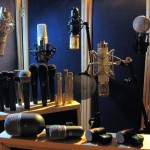 I had a great time doing an Interview with Bill DeWees. Check it out and look for more from Bill on his VoiceOverExpert You Tube Channel.
I had a great time doing an Interview with Bill DeWees. Check it out and look for more from Bill on his VoiceOverExpert You Tube Channel.
Thank you, Bill!
by Dan Friedman
 I had a great time doing an Interview with Bill DeWees. Check it out and look for more from Bill on his VoiceOverExpert You Tube Channel.
I had a great time doing an Interview with Bill DeWees. Check it out and look for more from Bill on his VoiceOverExpert You Tube Channel.
Thank you, Bill!
by Dan Friedman
 Recently there was a post on the Voice Artists United Facebook page that discussed coaches. The talent (who I do not know) wrote that he was discouraged by some comments that his most recent coach had made. At the time I write this, the post has 48 comments with some very popular names in the industry weighing in.
Recently there was a post on the Voice Artists United Facebook page that discussed coaches. The talent (who I do not know) wrote that he was discouraged by some comments that his most recent coach had made. At the time I write this, the post has 48 comments with some very popular names in the industry weighing in.
Don’t let the title of this article fool you. Getting some VO coaching is critical to your career. At a minimum, good coaches teach breathing, script construction, industry terminology, how to take direction and the mechanics of different styles and deliveries. They should also be teaching microphone technique, basic equipment needs and (hopefully) studio etiquette. Many coaches offer additional instruction on other topics related to voice over such as marketing, basic audio recording and audio editing. Coaches provide encouragement, direction and might even be able to get you a gig or two.
Voice coaches can be many things and their role and importance in your career can change as your career grows and progresses. The most important job of the coach is to be completely honest when evaluating your abilities and offering feedback. This feedback is important. But, at some point, you have to learn to hear “it” for yourself. The truth of the matter is, you have the best coach with you at all times… your ears.
Voice over coaches are indirectly trying to get every student to open their ears and truly listen. Learning to hear the differences and nuances in attitude, style, pacing, inflection, emphasis, amount of smile, etc. is, in my opinion, the real secret to doing voice over well. Almost anyone can learn to do these things with their voice if they are aware of what to do and practice doing it. However, being able to hear the subtle nuances of your delivery is what enables you to stop simply playing with words and allows you to become the communicator that every serious voice talent should work toward becoming.
Coaching deliberately teaches the techniques that get the brain, mouth and voice working together to physically do what needs to be done. But many voice talent fall short by failing to truly engage their ears. This is one reason why so many voiceovers are pieced together line by line by the engineers, whose job it is to use their ears everyday. While this is common in today’s world of fast digital editing and even clients have gotten comfortable working this way, this is not exactly how it is meant to be.
You have two ears and one mouth to remind you to use your ears twice as much. Record, read, playback, listen, adjust accordingly and do it over and over again. Learn to use your ears, use them purposefully and over time you will learn to trust them. You will know immediately what is working and what isn’t. You will learn to fine tune and self-correct. While you may still want to get professional voiceover coaching from time to time, for the most part, you will be your own coach. You will no longer need to feel discouraged by harsh critiques, or pay someone to give them to you. Instead you will get paid to take direction and be proud of the great work you’ve done for your clients.
by Dan Friedman
 A radio or television commercial is more than just words. The space between the lines helps to determine pace and establish mood. Space allows the mix engineer to create an environment in which the voice exists and where music and/or sound effects can be placed to help tell the story and communicate the message. This space and these elements are often key to the production.
A radio or television commercial is more than just words. The space between the lines helps to determine pace and establish mood. Space allows the mix engineer to create an environment in which the voice exists and where music and/or sound effects can be placed to help tell the story and communicate the message. This space and these elements are often key to the production.
Scripts often indicate that sound effects and music will play a key role at certain points within in a radio or TV production. These notes are great for the producer or engineer who mixes the spot. They give the mix engineer a clear idea of what the intentions of the client are and what the client is expecting to hear when the spot is finished.
However, what happens all too often is that the script is over written, leaving little or no time available for these elements to develop. They simply can’t have the impact they were intended to have. If a script, read out loud, is taking all of the time available, then what time is left for the music and sound effects to perform their role? Worse yet, the voice talent may feel forced to alter their speed or delivery to accommodate these elements. This may prevent the voice talent from communicating the message in the most effective way possible.
While there is little doubt that the message (the actual spoken words) should be the focus of most commercial audio productions, writing less copy provides space for music and sound effects to help communicate that message. In fact, these elements combined with the delivery of the voice talent, can often do more to communicate the overall message than including additional words in a script.
Radio and TV spots must fit into a specific time frame, usually :30 (:29.5 for TV) or :60 seconds. While these times are important, taking the time that will be needed for music and sound effects into consideration while writing and preparing a script can also be critical to your bottom line. The time saved in the studio by having a carefully written and timed script before recording begins, is time and therefore money saved.
Clients may insist on getting all of their critical information into a spot. But ultimately, clients want people to act (or buy something). Creative “ear catching” commercials are often more memorable and influential then a long string of words being forced upon a listener. The space between the lines, allows creativity to flourish.
Even if additional elements are not part of your radio or TV commercial, proper spacing and pacing will allow the listener to think about and hopefully act on what is being communicated to them.
by Dan Friedman
 I live in what I think (and many will agree) is one of the most beautiful parts of the USA. However, all that lush forest and beautiful foliage brings with it pollen, allergens, and air so thick you can watch it as it blows by. For most people, allergy season is merely a nuisance. For voiceover talent, it can be frustrating, frightening and costly.
I live in what I think (and many will agree) is one of the most beautiful parts of the USA. However, all that lush forest and beautiful foliage brings with it pollen, allergens, and air so thick you can watch it as it blows by. For most people, allergy season is merely a nuisance. For voiceover talent, it can be frustrating, frightening and costly.
Learning to deal with allergies was never a concern for me until a few years ago. I never suffered from allergies until moving to the mountains and even then it took a few years before they took hold of me. Spring of 2010 was by far the most difficult season I’d ever had. I was unable to hear well and I definitely did not sound like myself. As someone who earns a living from having sharp hearing and a consistent vocal sound, this was definitely a problem. While I was able to work, I did not feel confident in what I was hearing and I did not like how I was sounding.
I used the neti pot three times a day. I ate locally produced honey. Before and during sessions, I ate spicy food, brought jalapeño peppers into the booth with me and put mentholatum ointment under my nose. I took anti inflammatory medication, OTC Phenq allergy and cold medicines and finally, after six weeks of suffering, got a nasal spray prescription from my doctor. Thankfully that prescription cleared things up for me. Other than a few weeks during mid summer and mid winter, I’ve taken it ever since. While I still felt the effects of allergy season this year, overall it has been much better.
I was lucky. To my knowledge, I didn’t lose any voice work and my production work was solid. The sinus pain and pressure was bad, but the most difficult part was the fear that I would lose work and the lack of confidence I had in my abilities during this time. I know there are many voiceover talent who suffer from allergies and all of the symptoms that come with them. I tried everything before turning to a prescription for relief, but in the end it was the only thing that worked for me.
If you are an allergy sufferer and a voice talent…what works for you?
by Dan Friedman
 While there are many elements to producing great voiceovers, few are as important as the room you produce them in. While it is important to carefully evaluate the sound of your room when it is completed, there are some basic things to consider in the beginning that will help ensure your space will sound great in the end. Here are some quick tips on choosing and creating your VO space.
While there are many elements to producing great voiceovers, few are as important as the room you produce them in. While it is important to carefully evaluate the sound of your room when it is completed, there are some basic things to consider in the beginning that will help ensure your space will sound great in the end. Here are some quick tips on choosing and creating your VO space.
Location
The space you choose should be a quiet place. Basements can be a good choice because they are often underground. Upper levels can also be a good choice because they are free from noise overhead. Spaces in your home farthest away from roads or other sources of outside noise are ideal. Begin by picking the right location based on what is available to you, and you will be off to a good start.
Size
You need a space that is comfortable and capable of containing you and your equipment. At a minimum you need room for yourself, a microphone, microphone stand and a copy stand and/or computer monitor. You may also wish to have a chair and some of your equipment in the space with you (the quiet pieces only please).
Dimensions
It is important to consider the dimensions of your room. Because of the way sound travels, square rooms are bad. Ideally the dimensions will be different or not evenly divisible by one another.
Sound Proofing
In a home studio setup, it can be difficult to completely keep outside sounds from entering your recording space. This is why choosing the best location is critical. If you are building your space, you’ll want to isolate it as much as possible by separating it from the rest of your structure. Using double thick walls, creating air-gaps between walls and floating the floor are commonly used methods. Think of it as building a room within a room. If you are simply creating a space or using a prefabricated “voice booth”, keep it away from noisy household equipment and keep all of your noisy studio gear (anything with a running fan) outside of the room and away from the voicing area.
Acoustic Treatment
Treating the acoustics within your space is the final step. There are many products on the market that can help you with this or you can create your own. Acoustic foam panels of various sizes, thicknesses and shapes are just one of several options (panels made from mineral wool fiber covered in burlap are my personal choice.) Whether you are using pre-cut foam, buying other acoustic control materials or creating your own acoustic panels, the thickness of the panels determines what frequencies they work best to control. To tame bass or low frequencies you need thick panels, usually no less than 6 inches thick. For mid range and higher frequencies 2 and 3 inch thick panels will usually do the job. Absorbent materials and varied surfaces (such as pyramid or triangle shapes on foam) help to reduce reflections that cause a room to sound reverberant.
Location, size, dimensions, soundproofing and acoustic treatment are the fundamental considerations. This article is meant to get you thinking about these elements as you work on your voiceover recording space. For more in-depth information about room acoustics and sound treatment I recommend the following links:
Acoustics101.com
GIKAcoustics.com
RealTraps.com
For more information about sound and how it relates to your voiceover career check out: Sound Advice – Voiceover From An Audio Engineer’s Perspective.
It is important to understand that effective sound control requires that you utilize space and use materials that have mass. While there are several products available that wrap around your microphone or even you and your microphone, none of these are as effective as treating the room you are in properly. If you are serious about your career in voiceover you will get serious about your room. Other than your voice, nothing is more important to your sound than your recording environment.
by Dan Friedman
 Why am I writing this blog post? Because I want to remind you to take the time to stop and consciously ask yourself, “why?”. “Why?” is a question that we often forget to ask ourselves as we go about our day or do our jobs. Typically, we either know the answer (or think we do) based on past experience or we simply do what we always do out of habit. We also have a tendency to do things because someone told us to, but without asking ourselves why doing what they said is the right thing to do. Taking the time to ask and answer this simple question can be very enlightening. It can also help you make better decisions about gear, deliveries, production and maybe even your life… but today, we’ll just focus on your career.
Why am I writing this blog post? Because I want to remind you to take the time to stop and consciously ask yourself, “why?”. “Why?” is a question that we often forget to ask ourselves as we go about our day or do our jobs. Typically, we either know the answer (or think we do) based on past experience or we simply do what we always do out of habit. We also have a tendency to do things because someone told us to, but without asking ourselves why doing what they said is the right thing to do. Taking the time to ask and answer this simple question can be very enlightening. It can also help you make better decisions about gear, deliveries, production and maybe even your life… but today, we’ll just focus on your career.
If your shopping for new gear ask yourself:
Why do I need new gear?
Why am I considering this microphone?
Why do I like this mic preamp?
If you’re in the booth reading a script ask yourself:
Why am I using this emphasis or these inflections?
Why is this the direction that has been given?
Why is this the right delivery?
If you are doing editing and production ask yourself:
Why am I using several compressors, 2 EQs and a limiter on this channel?
Why does this take sound better than that other one?
Why will this music bed work better than another one?
If you are directing, writing or preparing for a voiceover session ask yourself:
Why is this the right voice for my production?
Why don’t I try reading this out loud and use a stopwatch to see if it fits in time?
Why is this talent taking 42 takes to read my :05 tag?
Sometimes the answer is obvious and you can answer the question of “why?” easily. Sometimes it leads to more questions. Either way, taking the time to consciously ask often produces more definitive answers and ultimately greater awareness. While we rarely stop and take the time to ask ourselves this most basic question, doing so can often change the way we look at what we do and how we do it. It keeps us thinking, growing and improving. Why would anyone question that?
©2025 Dan Friedman Sound4VO // Voice Over Site by Voice Actor Websites